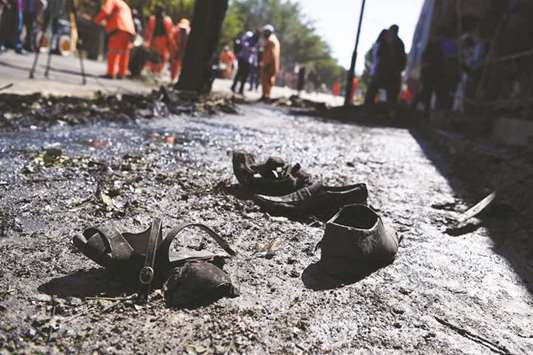At least 26 people were killed and 41 wounded yesterday after a Taliban-claimed car bomb struck a bus carrying government employees through a Shia neighbourhood in Kabul, raising fears of sectarian violence in the Afghan capital.
The assault came as a presidential spokesman said the Taliban also killed at least 35 civilians in an attack on a hospital in central Ghor province over the weekend.
The deadly attacks underscore spiralling insecurity in Afghanistan as the resurgent Taliban ramp up their offensive across the country, while security forces struggle to contain them.
In yesterday’s blast the bus was carrying employees of the ministry of mines, passing from western Kabul to the downtown ministry during rush hour, interior ministry spokesman Najib Danish told AFP.
It was struck by the car bomb as it passed through a busy area of the capital that is home to many Shia Hazaras, a persecuted ethnic minority.
An AFP photographer at the scene saw multiple bodies and wounded people in the street, surrounded by shattered glass as security forces cordoned off the area.
The bus’s charred remains were left smoking in the middle of the road as the wounded were rushed to hospitals in ambulances as well as private cars and taxis.
“It was a huge explosion, my house nearly collapsed,” a neighbourhood resident who gave his name as Mostafa told AFP, adding that the street was “filled with human flesh and blood”.
“It was horrible,” said shopkeeper Momin. “It is a crowded area — many of my friends and other shopkeepers are either killed or wounded.”
The Taliban claimed responsibility for the blast, which came just before 7am.
The group rarely claims attacks with high civilian casualties, but does frequently target government employees.
Afghan presidential spokesman Shah Hussain Murtazawi put the toll at 26 dead and 41 wounded.
At a press conference, Murtazawi also said at least 35 people were killed in the hospital attack over the weekend.
All the victims were civilians, Murtazawi said, without specifying if they were patients or staff.”This is a cruel crime against humanity,” he added.
He did not elaborate, and officials say phone lines are down in Taywara district, captured by the militants over the weekend.
The Taliban have denied the claim and reports they torched the hospital, though a spokesman said parts of the building were damaged in fighting.
Ghor is a poor, mountainous province that has been relatively safe in the past but shares a border with the Taliban-infested provinces of Helmand and Farah.
— Demonstration cancelled —
Afghan forces control 59.7 % of the country, according to a US watchdog’s report issued in May after the winter lull in fighting, up slightly from the previous quarter.
But the insurgents have ramped up their offensive across the country since launching their so-called “spring offensive” earlier this year.
Monday’s attack in Kabul came as the Hazara community had planned to hold a demonstration in the same neighbourhood to mark the one-year anniversary of twin bombings that killed 84 people in an attack claimed by Islamic State.
They had agreed to postpone the demonstration over security fears and after meeting with President Ashraf Ghani on Sunday.
The Taliban have carried out sectarian attacks in the past, though they have been rare in Sunni-majority Afghanistan throughout its decades of war.
The rise of IS, which has frequently targeted Shias, has fuelled the spectre of more such assaults, with fears yesterday that Hazaras had been the target of the car bomb rather than the government employees.
Others suggested the politician Mohamed Mohaqeq, whose home is nearby, could have been the target.
Kabul is regularly rocked by suicide bombs and assaults.
A recent UN report showed that attacks on the capital accounted for nearly one-fifth of all civilian Afghan casualties in the first half of 2017.
Many died in a single devastating attack in late May when a truck bomb exploded, also during the morning Kabul rush hour, killing more than 150 people and injuring hundreds.
The bloody toll for the first six months of 2017 has unsettled the government and put increasing pressure on Ghani, who condemned yesterday’s attack.
Nato’s combat mission in Afghanistan ended three years ago, handing sole responsibility to the country’s security forces, which have also suffered spiralling casualties as they try to beat back the Taliban.

Footwear of victims are seen on the ground as Afghan residents inspect the site of a car bomb attack in western Kabul yesterday.
